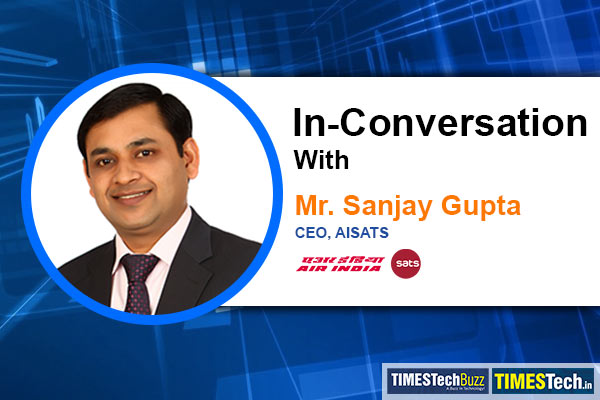AISATS CEO, Mr. Sanjay Gupta, reveals groundbreaking tech advancements enhancing operational efficiency and passenger experiences at Air India SATS (AISATS). From AeroWash to ground radar systems, AISATS is pioneering innovative solutions reshaping the aviation industry.
Read the full interview here:
TimesTech: Can you highlight recent tech innovations at Air India SATS and their impact on operational efficiency?
Mr. Sanjay: Technology is one of the pillars that AISATS relies on to provide world-class ground handling and cargo handling services to its airline customers and their passengers. (the other 3 pillars being Human Touch, Excellence and Sustainability). Some of our key technological innovations include:
AeroWash– AeroWash is India’s first and only robotic drywash aircraft exterior cleaning system and AISATS is the world’s first ground handler to offer this service This revolutionary system helps airlines reduce aircraft aerodynamic drag, fuel costs and turnaround time while saving water and reducing their carbon footprint. Enclosed are key benefits offered by this technique
- Saves 1.02 M liters of water annually (NB)
- Saves 41 kg ATF per flight
- AeroWash uses a 100% plant-based cleaner, free of petroleum derivatives or chemical additives.
Ground Radar- It is a connected aviation platform that combines AI, IoT, deep-sensing technology, ML, big data analytics setting benchmarks of precision time schedules for operations. This technology predicts the number of staff and equipment required through rostering module as it works on sensor-based GSE tracking.
Centralized Load Control– This technology cconsolidates and centralizes aircraft weight & balance management for accurate load planning and optimum fuel efficiency.
i-Boarding- i-boarding improves passenger experience during carry-on baggage weight and size control.
All the technological products and platforms help us navigate the everyday airport environment, balancing the complex demands of numerous stakeholders. They help us mitigate these complexities, reduce costs and remove inefficiencies to better serve our airline customers.
TimesTech: How has Aero Wash improved aircraft turnaround times and hygiene standards?
Mr. Sanjay: AeroWash helps reduce aircraft washing time by 2 hours (narrow body aircrafts) compared to manual washing. This minimizes aircraft ground time and quickens the turnaround process. AeroWash also uses a 100% plant-based cleaner that thoroughly removes stubborn dirt, soil and oil-based streaks found on the fuselage (compared to manual cleaning). This cleaner is 100% biodegradable and free of petroleum derivatives and chemical additives. This leads to a superior cleaning result with better hygiene and cleanliness levels and leaves a polished finish which reduces skin friction drag on the aircraft.
TimesTech: In what ways does the ground radar system improve operational safety?
Mr. Sanjay: The Ground Radar declutters the parking bay and optimizes the apron space for more efficient aircraft handling. It prevents any incursions and mishaps at the ramp area with the proper placement of all equipment in relation to the aircraft. Ground Radar system has camera AI for real-time surveillance and conflict management due to which it enables real time tracking of equipment, resource allocation as per schedule and preventive & predictive maintenance for equipment. Due to its dynamic task management capability it helps in reduction of manpower by 10-15 % and reduction in fuel cost by 6%
TimesTech: Can you provide details about AISATS’s other notable technology-enabled products, like solar-powered passenger ramp bridges and electric buses, which contribute to seamless travel experience?
Mr. Sanjay: Our Solar-Powered Boarding Ramps have been built in-house and we are the only ground handler in India to use such equipment during our aircraft turnarounds. These ramps provide a safe, streamlined, less stressful, dignified boarding/disembarkation experience while serving passengers with health conditions or impairment, senior citizens and passengers with children. Our ramps generate 12, 225 KWH of power annually and are free of carbon emissions.
AISATS has introduced 25 electric passenger coaches across our stations. The simplicity of a battery-operated passenger coach makes it a compelling choice and the comfort it offers our passengers makes it a smart long-term solution for passenger mobility between terminals and on the tarmac. These coaches help us reduce our carbon emissions by 254 tons annually.
TimesTech: What’s in store for future tech advancements at Air India SATS?
Mr. Sanjay: Airports are evolving ecosystems that need to respond to their environment in real time. We are looking to incorporate more AI within our services to respond to fluctuations in passenger traffic, flight schedules, cargo volumes etc. We would like to include more AI assistants for operational support and insights on daily tasks while using AI decision support for data analysis to help any crises and reduce bottlenecks. Our goal is to offer more efficient solutions to make the curb-to-gate journey as seamless as possible. We are also seeking to push our sustainability credentials to new heights and decarbonize our services in keeping with India’s Net Zero targets.
TimesTech: Briefly, what are the objectives of the Multi-Modal Cargo Hub and the logistics park projects?
Mr. Sanjay: AISATS is building India’s first Multi Modal Cargo Hub at Noida International Airport and developing a Logistics Park at Kempegowda International Airport, Bengaluru. These projects give us the opportunity to enhance the air freight capacity in India, strengthen the Indian supply chain and ease road and rail freight congestion. Our goal is to combine the latest air cargo handling physical infrastructure with world-class technological innovations to meet the Indian government’s ambitious cargo throughput goals.
TimesTech: With India’s aviation sector in a highly growing phase, please share your insights on how the aviation industry is adopting cutting-edge digital solutions to enhance operational efficiency and elevate customer experiences.
Mr. Sanjay: The Indian aviation sector is witnessing unprecedented growth and is set to become the third largest aviation market. Despite this growth, the industry faces many challenges such as volatile fuel prices, high operational costs, evolving regulatory frameworks etc. To add to this, the average Indian traveller is a digitally savvy individual and is seeking highly customized brand experiences.
Optimizing the overall customer experience has become a key goal in ensuring that the Indian aviation industry remains on its growth trajectory. The incorporation of integrated data platforms and the application of advanced AI tools are crucial in optimising customer interactions and experiences. We must leverage technology to enhance time management, cost effectiveness and productivity while offering more personalized, unique travel experiences to our passengers.
Our industry’s long term success hinges on finding that delicate balance between embracing technology and offering meaningful human interactions. At AISATS, we constantly strive towards ensuring that the human element is not marginalized within the digitalization wave. An example of this is our Take Off With A Smile campaign. This campaign has our ramp staff wave goodbye to passengers and crew as they taxi down the runway for take-off. While this may be a small gesture, we believe this is a key approach in ensuring that passengers can experience the human element behind their travel experience even as technology enhances it.















